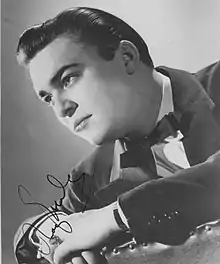Ray Eberle
Raymond Eberle (January 19, 1919 – August 25, 1979) was a vocalist during the Big Band Era, making his name with the Glenn Miller Orchestra. His elder brother, Bob Eberly, sang with the Jimmy Dorsey Orchestra.
Ray Eberle | |
|---|---|
 Ray Eberle in 1943 | |
| Background information | |
| Birth name | Raymond Eberle |
| Born | January 19, 1919 Mechanicville, New York, U.S. |
| Died | August 25, 1979 (aged 60) Douglasville, Georgia, U.S. |
| Genres | Big band, swing, Traditional Pop |
| Occupation(s) | Singer |
| Instruments | vocals |
| Years active | 1938 - 1979 |
| Associated acts | Glenn Miller Orchestra Tex Beneke Marion Hutton |
Career
Eberle was born in Mechanicville, Saratoga County, New York. His father, John A. Eberle, was a local policeman, sign-painter, and publican (tavern-keeper). His elder brother was Big Band singer Bob Eberly, who sang with the Jimmy Dorsey Orchestra. Ray started singing in his teens, with no formal training. In 1938, Glenn Miller, who was looking for a male vocalist for his big band, asked Bob Eberly if he had any siblings at home who could sing. Bob said "yes", and Ray was hired on the spot.[1]
Eberle recalled walking by a table when his similar-looking brother was performing, and being stopped by Miller and invited to audition.[2] Music critics and Miller's musicians were reportedly unhappy with Eberle's vocal style but Miller stuck with him.[1] Critic George T. Simon said that Miller pitched Eberle's keys too high, straining Eberle's voice. Simon noted that when singing in lower keys, Eberle's sound was richer.[3]
Eberle went on to find success with Miller,[4] deeming the songs for Orchestra Wives, such as the jazz standard "At Last", to be among his favorites as there were songs he could "sink my teeth into, and make a story out of".[5] He appeared in the Twentieth Century Fox movies, Sun Valley Serenade (1941) and Orchestra Wives (1942).
He made several Universal films, including Mister Big, making a cameo appearance as himself. Eberle mostly sang ballads. He led his own orchestra called, The Ray Eberle Orchestra as well as the Serenade In Blue Orchestra from 1943 and maintained his band until his death in 1979.[6] From 1940-43 he did well on Billboard (magazine)'s "College Poll" for male vocalist.[7] He also appeared on numerous television variety shows in the 1950s and 1960s.
Ray Eberle sang lead on "Sometime", composed by Glenn Miller in 1939, "Polka Dots and Moonbeams", "At Last", a number 9 chart hit on Billboard in 1942, and "To You", but Miller ran a tight ship and often fired people after one negative incident. Eberle was stuck in traffic one day during a Chicago engagement, and was late for a rehearsal. Miller fired him on the spot, and replaced him in June 1942 with Skip Nelson. After his departure from Miller, Eberle briefly joined Gene Krupa's band before launching a solo career.[1] He later joined former Miller bandmate Tex Beneke's orchestra in 1970 for a national tour, and reformed his own orchestra later in the decade.
Personal life
Ray and his wife, Janet (née Young), had three children, Jan, Laurie and Raye Ellen Eberle. Janet's daughter Nancy Atchison became Nancy Eberle when she was adopted by Ray. Janet died in 1964. Ray had two sons from his second marriage to Joanne Eberle (née Genthon), Ray Eberle Jr. and John Eberle. He also has numerous grandchildren. Ray Eberle died of a heart attack in Douglasville, Georgia on August 25, 1979, aged 60.[8]
References
- Solid! -- Ray Eberle Archived 2011-09-25 at the Wayback Machine
- Gilliland, John (1994). Pop Chronicles the 40s: The Lively Story of Pop Music in the 40s (audiobook). ISBN 978-1-55935-147-8. OCLC 31611854. Tape 2, side A.
- Simon, George T. (1980). Glenn Miller and His Orchestra. New York: DaCapo. p. 129. ISBN 0-306-80129-9.
- Gilliland 1994, tape 1, side A.
- Chattanooga Choo Choo: The Life and Times of the World Famous Glenn Miller by Richard Grudens, pp. 144-47
- Swing by Scott Yanow, pp. 101-03
- Billboard magazine for April 24, 1948
- Obituary from the New York Times